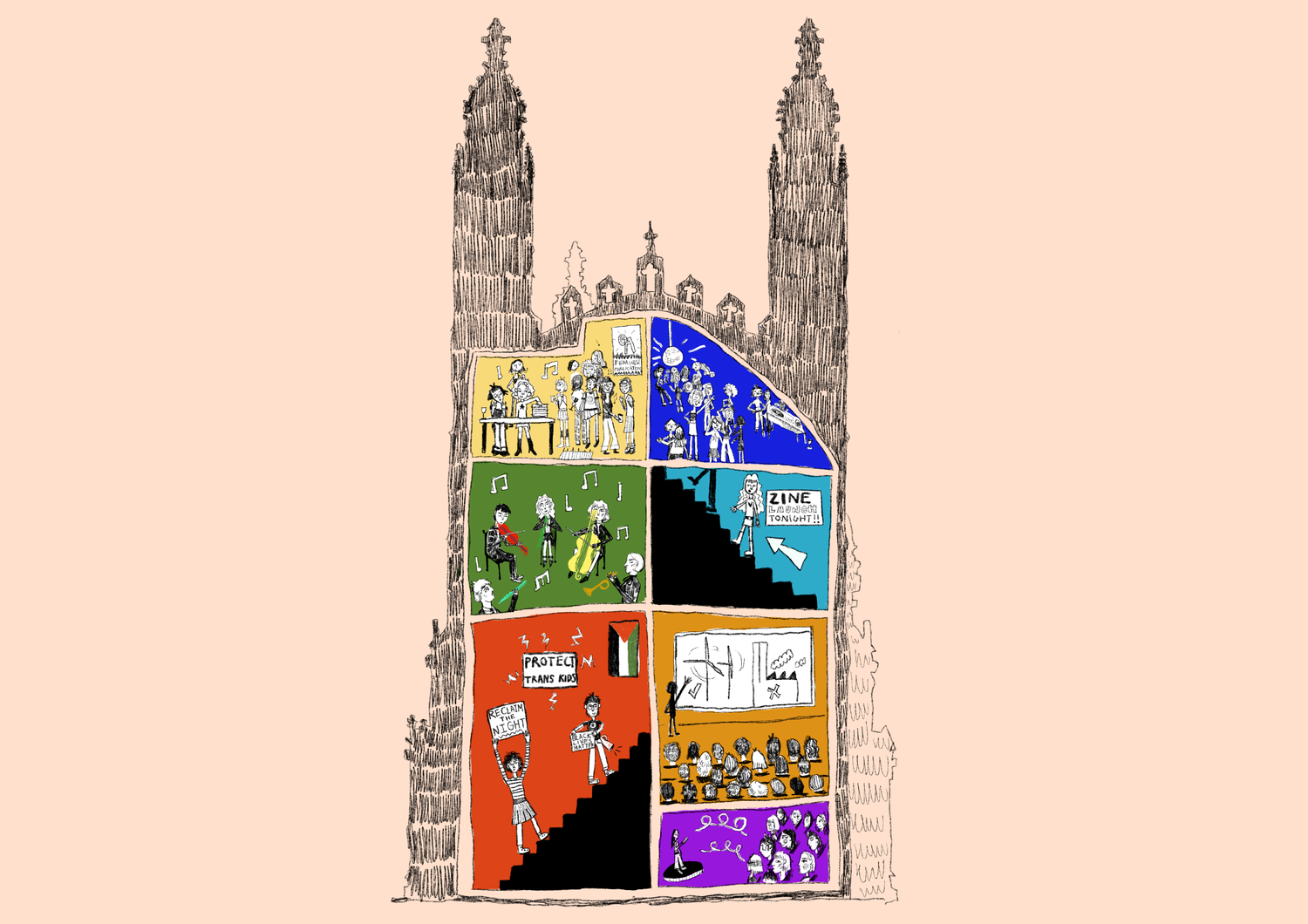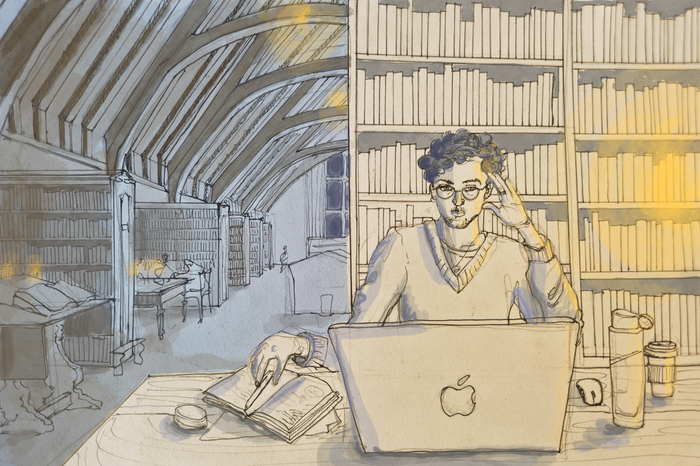We return to Cambridge at a time of profound political instability and uncertainty. The fear young people feel is accelerating because of the increase in crises at home and abroad, resulting in both disillusionment and disengagement. Yet five new student initiatives in Cambridge in areas that range from politics to poetry have chosen the path of action. They seek to identify and address the prevalent issues in their respective areas, to counter disillusionment with collaborative and meaningful action.
In pursuit of political engagement – Jesus College Politics Society:
Many are turning away from politics as a means to address mounting crises. As of July 2025, the Common UK think-tank found that 87% of Britons have little or no trust in politicians. The risks posed for political legitimacy by this retreat were evidenced by the last general election, which, according to the Institute for Public Policy Research, witnessed the lowest voter turnout (52%) since the introduction of universal suffrage in 1928.
While Cambridge boasts a long history of student politics, concerns about political disengagement and its implications do not stop at its historical walls. It was this that led Aiya, a second year HSPS student, to found the Jesus College Politics Society.
“Many are turning away from politics as a means to address mounting crises”
“One of the biggest things that we’re trying to do is foster direct engagement,” she explains to us, before pointing to the formality and distance between speaker and audience of many university events as the main barrier to this engagement.
Instead, Aiya plans to host casual drinks receptions after every event “so that people are actually able to sit with the speakers of the events and discuss with them casually”.
The topics of the society’s first term of events range from the resurgence of far-right extremism to the impact of humanitarianism in the Middle East, and have been selected for their relevance, actuality, and potential to inspire action. Aiya demonstrates that “we don’t just want to bring in someone who might abstractly talk about the humanitarian effort, but rather someone who felt the brunt of that humanitarian effort and can come back and tell us concretely what they’ve experienced”.
Globalising healthcare – The University of Cambridge MedBrigades:
At Cambridge, medical students are acutely aware of this need for practical action. In the international humanitarian sector, global healthcare funding has rapidly declined in recent years. In this year’s Spring Statement, PM Keir Starmer announced that future international development spending would decrease from 0.5 per cent of gross national income (GNI) to 0.3 per cent by April 2027, and other European countries are following suit. Within this context, the University of Cambridge MedBrigades was founded – “a society set up in partnership with the Global Medical Brigades which aims to gather volunteers to participate in a ‘brigade’ to one of six countries: Belize, Guatemala, Honduras, Panama, Ghana, or Greece”.
“It’s about standing alongside people who face barriers to basic medical care”
Nehansa Siriwardena and Aaron D’souza, two individuals at the centre of this cause, tell us that the initiative “seeks to advocate for communities with limited to no access to healthcare and basic human needs”.
They highlight how “it’s about standing alongside people who face barriers to basic medical care and working to highlight the challenges they experience every day”.
The Cambridge MedBrigades focus on collaboration, participation, and raising enough funds to support the communities they will serve. They “aim to educate students at Cambridge about the overarching public health sector as well as introduce clinical skills with the aid of medical students currently in their clinical training too”.
They keenly stress the importance of participation, not just from medical students, but from all those who want to make a positive impact in the world.
Uncovering hidden voices – Attraverso Zine
The celebration of global communities is something close to the heart of Giulia Reche-Denese, founder and editor-in-chief of the literary zine Attraverso. The zine, which will publish poetry in foreign languages and English, seeks to enrich the Cambridge literary scene through poetic translation.
She illustrates that “instead of creating a space for just foreign-language poetry – deepening the divide between international or polyglot students – Attraverso focuses on multilingualism as a means to explore the fascinatingly mysterious nature of language, which is particularly intriguing when it comes to poetry”.
“Giulia envisions poetry as a force able to unite international and domestic student communities”
What makes this zine authentic in its approach to literature, Giulia explains, is that, “our unique premise is also a way to advocate for translation as a creative practice, rather than a utilitarian means that mistakenly attempts to create an impossibly equivalent artwork. Translation is an art form in itself”.
She continues: “By not specifying which is which, the poem and its translation have the opportunity to exist as two deeply interlinked yet independent and non hierarchically organised entities.”
Giulia envisions poetry as a force able to unite international and domestic student communities: “Realising we have more in common than we initially thought – that communities are much more all-encompassing than we suspected – is crucial to bridge them together.”
She adds that: “small-scale publishing is people coming together for the sole sake of sharing and valorising art. It’s a beautifully near-utopian mission!”
Advocating for students’ material interests – UCLS:
The advancement of the student community is, according to its founders, central to the program of the University of Cambridge Leftist Society. UCLS, recently launched by HSPS students Aidain Clair and Rares Cocilnau, aims to reshape leftist student politics and raise awareness of the University’s alleged entanglement in global issues.
Rares identifies “rising rents, insecure living conditions, and creeping immiseration, especially with the announced increase in tuition fees” as the central issue and Aidain adds that “rent rises across the board at the University remain ahead of inflation and one of the biggest forms of financial strains for working class students”. Indeed, students across the UK are struggling to meet costs of living, while Cambridge students are subjected to rents as high as 53% of the value of the maximum SFE maintenance loan.
The two proclaim: “In light of that, UCLS emerges as a space where thought and action converge, and where critique is really something that’s operative.”
The critique articulated by UCLS is twofold – directed not just against the University´s failure to cut costs for its students and at “the commodification of knowledge,” but at the broader implications of its alleged global entanglements. Rares alleges that Cambridge is “woven into the structures of global finance and a military industrial complex”.
“Do not accept apathy and passivity”
The programme Rares and Aidain outline seeks to combine social action with education. From contacting homeless charities to volunteering at community kitchens and food collections, UCLS aims to counter the “sterile separation between thought and action” that they see on the left.
Talks and discussions, too, are envisioned as future events. “For us education is […] a means of arming students with the historical and theoretical consciousness necessary to wage a struggle that is in their interest.”
Saving self-expression and social connection – Cambridge Sound:
Cambridge Sound is a recently founded collaborative initiative of local artists, DJs, and bands, including Off the Record and Slipped Disc, which aims to provide students with the chance to experience an “affordable and accessible” route into a thriving nightlife culture by bridging venues with independent artists.
Joe Garvey, one its organisers, reveals that the movement was prompted by the disappointment countless freshers felt about the culture of Cambridge clubbing.
Such complaints can be attributed to the decline of Britain’s nightlife in recent years, largely due to economic hardship, which has resulted in the loss of 400 clubs across the UK over the last five years. The Night Time Industries Association (NTIA) stresses that this decline “transcends mere economic repercussions,” because nightclubs are “vital hubs of social interaction, artistic expression, and community cohesion, making their preservation imperative”.
Joe seconds this, stating that independent venues, large numbers of which have closed down in recent years, “are more important than they’ve ever been”.
Nightclubs also face growing concerns about safety, particularly from spiking. Joe suggests that while safety is an ongoing concern for the nightlife industry, nights out run by students have the potential to be safe spaces for all partygoers: “People are there for the community.”
“I realised how strong a grip the system of JCR fresher’s wristbands and ticket reps had over incoming freshers. People were wanting something more, something better – but never got introduced to what’s really out there in their first year.” Joe, and these other society pioneers, are trying to change the ways we engage with politics, culture and nightlife as students – and add an element of variety to student life.


